Since then, the people have become masters of the country and of their own destiny, and stayed united to build a prosperous and happy life.
    |
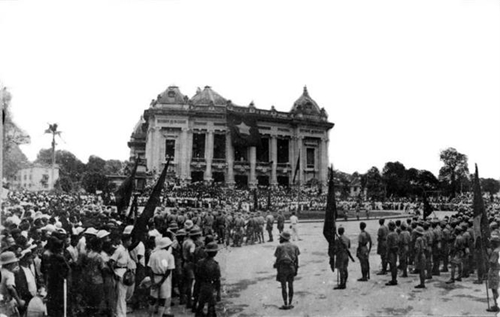 |
|
The August Revolution opens up a new era in Vietnam, when the Vietnamese people are masters of the country and their own destiny. |
Keeping the spirit of the past, the nation is striving to win more feats in the new revolutionary period, bringing the country forward with quick and steady steps, turning the aspiration for development into reality, and building a strong Vietnam.
Maintaining achievements, promoting values of the August Revolution
In autumn 1945, under the sound leadership of the Communist Party of Vietnam (CPV) and President Ho Chi Minh, Vietnamese people conducted the August Revolution to defeat the oppression and exploitation by the colonial and feudal regimes, and seize power to establish the Democratic Republic of Vietnam - the first workers’ and peasants’ state in Southeast Asia.
    |
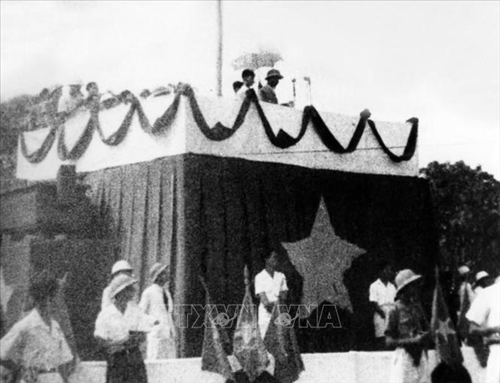 |
|
On September 2, 1945, at Ba Dinh Square, President Ho Chi Minh reads the Declaration of Independence. |
On September 2, 1945, at Ba Dinh Square, President Ho Chi Minh read the Declaration of Independence proclaiming the nation, compatriots and the whole world that Vietnam has the right to enjoy freedom and independence. It has in fact has become a free and independent country. The Vietnamese people are determined to put all their spirit and strength, life and assets to uphold the right to freedom and independence.
Over the past 78 years, the Vietnamese people have made every effort to maintain the achievements and promote the values of the August Revolution, protect national independence, and bring about freedom and happiness for themselves.
Immediately after the August Revolution, the Vietnamese revolution faced a lot of difficulties, but in a short time, the Party, State and the people worked miracles, including the successful organization of the first general election on a national scale to elect the National Assembly, establishing the government, promulgating the Constitution, building and consolidating the government from the central to local levels, building up the people's armed forces, and expanding the great solidarity bloc of the whole people.
Those are the conditions and legal basis of special importance for the Democratic Republic of Vietnam to weather numerous difficulties and challenges, resolutely protect the administration, and defend the achievements of the Revolution.
When the French colonialists invaded the country again, the Vietnamese people joined a long and comprehensive resistance war, with the firm belief that "the resistance war will definitely win."
The Party, people, and army united to form an invincible strength making the resistance war a glorious victory, with the peak being the historical Dien Bien Phu Campaign which shook the world.
Having just got out of the 9-year resistance war against the French colonialists, the Vietnamese people had to enter the fight against US imperialists. Faced with that great challenge, under the sound leadership of the Party and with President Ho Chi Minh's appeal of "Nothing is more precious than independence and freedom," the whole country united to fight, and defeated the U.S. invaders.
Experiencing a long and glorious battle, with the 1975 Spring General Offensive and Uprising at the end, and the historical Ho Chi Minh Campaign as its peak, the Vietnamese people won a glorious victory completely liberating the South.
Great achievements gained in Doi Moi (Renewal)
After the great victory in the Spring of 1975, the entire Party, people, and army focused on healing the wounds of the war, building a new life, and carrying out the task of building and defending the Fatherland.
    |
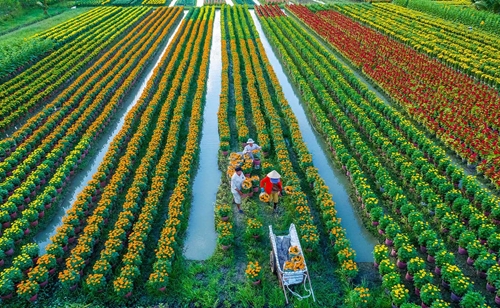 |
|
Fifteen years after administrative boundary expansion (2008-2023), Hanoi has become a civilized and modern capital, a driving force for the development of the Red River Delta and the whole country. |
In the first five-year plan in the 1976-1980 period, most of the industrial, agricultural and transport establishments in the North were restored, and rural areas in the South devastated by the war rebuilt; the state-run economy and the collective economy in the North consolidated, and the private industry and trade in the South initially arranged. The social labor force was initially redistributed.
In the early years of the second five-year plan (1981-1985), many important resolutions and decisions of the Party and Government were issued in order to gradually amend the management mechanism for the agricultural and industrial economy as well as the private economy, and eliminate bureaucracy and subsidies.
However, in the early years after the reunification, Vietnam had to face a lot of challenges and difficulties. While heavy consequences of the war had yet to be addressed, Vietnam had to fight to protect the sovereignty and territorial integrity of the fatherland and fulfill its international obligations, and at the same time fight the blockage and embargo imposed by hostile forces, while continuing to explore and test ways to build socialism. Along with objective difficulties, there were also subjective limitations that resulted in a socioeconomic crisis.
    |
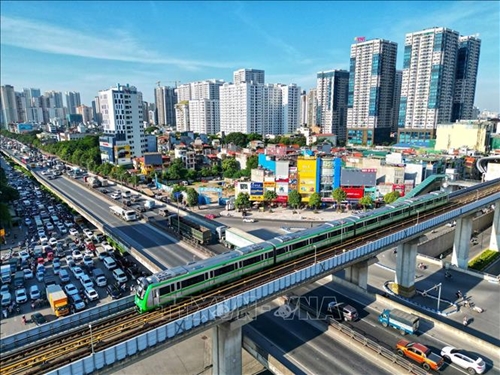 |
|
Vietnam has also become an attractive destination for foreign tourists and investors. |
Responding to the country's urgent requirements, from the sixth National Congress (1986), the Party initiated the Doi Moi (Renewal). With efforts of the Party and people, to date, after nearly 40 years, Vietnam has gained great achievements.
The country has left behind its underdeveloped status, with its economy growing rapidly and export turnover regularly increasing at a double-digit rate. Despite the serious impact of the COVID-19 pandemic, last year’s total trade turnover exceeded 732 billion USD, up 9.5% year-on-year, with a surplus of 11.2 billion USD, marking the seventh consecutive year Vietnam recorded a trade surplus.
Vietnam has also become an attractive destination for foreign tourists and investors. In 2019, before the COVID-19 pandemic broke out, Vietnam welcomed 18 million foreign travelers and in the first seven months of this year, the figure reached 6.6 million, equal to about 83% of the plan set out for 2023. In the period, the country attracted 15.41 billion USD in foreign investment.
    |
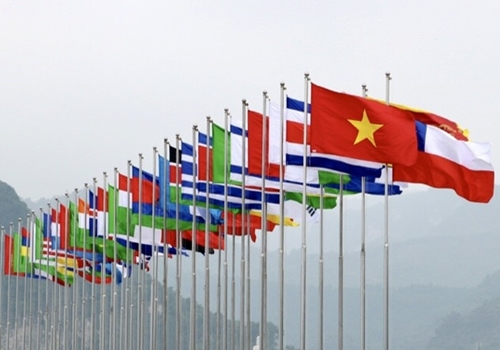 |
|
Foreign relations and international integration are becoming more and more extensive and effective. Vietnam has established diplomatic relations with 190 countries. (Photo: congthuong.vn) |
The economy has developed rapidly, people's material and spiritual life improved markedly, and social welfare been ensured. Education and training have received due attention, and public health care made great progress. In 2022, the poverty rate nationwide decreased to 4.3%.
Foreign relations and international integration are becoming more and more extensive and effective. Vietnam has established diplomatic relations with 190 countries. It has joined and actively built up the ASEAN Economic Community, and effectively participated in regional and international economic links at many levels, especially in building strategic economic cooperation partnerships.
The building of the Party and political system has achieved important results, the great national solidarity bloc been consolidated and strengthened, national defense and security strengthened, and national sovereignty maintained.
Source: VNA